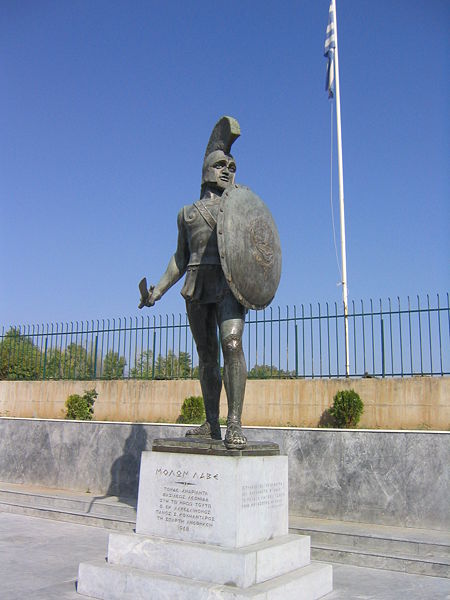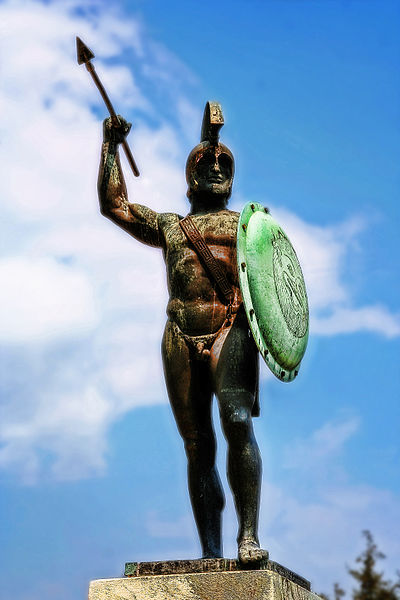<Back to Index>
- King of Sparta Leotychidas II (Λεωτυχίδας Β'), 545 B.C.
- King of Sparta Leonidas I (Λεωνίδας Α'), 540 B.C.
PAGE SPONSOR
Born in Sparta around 545 BC, Leotychidas was a descendant of the Royal House of the Eurypontids (through Menamus, Agesilaus, Hippocratides, Leotychides, Anaxilaus, Archidamos, Anaxandridas I and Theopompus) and came to power in 491 BC with the help of the Agiad
King Cleomenes I by challenging the legitimacy of the birth of
Demaratus for the Eurypontid throne of Sparta. Later that year, he
joined Cleomenes' second expedition to Aegina, where ten hostages were
seized and given to Athens.
However after Cleomenes' death in 488 BC, Leotychidas was almost
surrendered to Aegina.
In the spring of 479 BC, Leotychidas commanded a Greek fleet consisting of 110 ships at Aegina and later at Delos, supporting the Greek revolts at Chios and Samos against Persia. Leotychidas defeated Persian military and naval forces at the Battle of Mycale on the coast of Asia Minor in the summer of 479 BC (possibly around mid August). In 476 BC, Leotychidas led an expedition to Thessaly against the Aleuadae family for collaboration with the Persians but withdrew after being bribed by the family. Returning to Sparta he was tried for bribery, and fled to the temple of Athena Alea in Tegea. Sentenced to exile, his house was burned and his grandson Archidamus II, son of his son Zeuxidamus, called Cyniscus by many Spartans, who had died in his father's life, became the ruler of Sparta. Leotychidas died some years later, around 469 BC.


Leonidas I (Doric and Modern Greek: Λεωνίδας, Leōnidas; Ionic Greek: Λεωνίδης, Leōnidēs; "son of the lion"; died 480 BC) was a Greek hero - king of Sparta, the 17th of the Agiad line, third son of King Anaxandridas II of Sparta, who was believed in mythology to be a descendant of Heracles, possessing much of the latter's strength and bravery. Leonidas I is notable for his leadership at the Battle of Thermopylae.
According to Herodotus, Leonidas' mother was his father's niece and had been barren for so long that the ephors, the five annually elected administrators of the Spartan constitution, tried to prevail upon King Anaxandridas to set aside his wife and take another. Anaxandridas refused, claiming his wife was blameless, whereupon the ephors agreed to allow him to take a second wife without setting aside his first. This second wife, a descendant of Chilon the Wise, promptly bore a son, Cleomenes. However, one year after Cleomenes' birth, Anaxandridas' first wife also gave birth to a son, Dorieus. Leonidas was the second son of Anaxandridas' first wife, and either the elder brother or twin of Cleombrotus. Because Leonidas was not heir to the throne, he was not exempt from attending the agoge, the public school that the sons of all Spartans had to complete in order to qualify for citizenship. Leonidas was thus one of the few Spartan kings to have ever undergone the notoriously harsh training of Spartan youth.
Anaxandridas died in 520 BC and Cleomenes succeeded to the throne sometime between then and 516 BC. Dorieus was so outraged that the Spartans had preferred his half brother over himself that he found it impossible to remain in Sparta. He made one unsuccessful attempt to set up a colony in Africa and, when this failed, sought his fortune in Sicily, where after initial successes he was killed. Leonidas' relationship with his bitterly antagonistic elder brothers is unknown, but he married Cleomenes' daughter, Gorgo sometime before coming to the throne in 490 BC.
Leonidas was clearly heir to the Agiad throne and a full citizen at the time of the Battle of Sepeia against Argos (c. 494 BC). Likewise, he was a full citizen when the Persians sought submission from Sparta and met with vehement rejection in or around 492 / 491 BC. His elder brother the king had already been deposed on grounds of purported insanity, and had fled into exile when Athens sought assistance against the Persian invasion that ended at Marathon (490 BC).
Plutarch has recorded the following: "When someone said to him: 'Except for being king you are not at all superior to us,' Leonidas son of Anaxandridas and brother of Cleomenes replied: 'But were I not better than you, I should not be king.'" As the product of the agoge, Leonidas is unlikely to have been referring to his royal blood alone but rather suggesting that he had, like his brother Dorieus, proven superior capability in the competitive environment of Spartan training and society, and that he believed this made him qualified to rule.
Leonidas was chosen to lead the combined Greek forces determined to resist the Persian invasion in 481 BC. This was not simply a tribute to Sparta's military prowess: The probability that the coalition wanted Leonidas personally for his capability as a military leader is underlined by the fact that just two years after his death, the coalition preferred Athenian leadership to the leadership of either Leotychidas or Leonidas' successor (as regent for his still underaged son) Pausanias. The rejection of Leotychidas and Pausanias was not a reflection on Spartan arms. Sparta's military reputation had never stood in higher regard, nor was Sparta less powerful in 478 BC than it had been in 481 BC.
This election of Leonidas to lead the defense of Greece against Xerxes' invasion led to Leonidas' death in the Battle of Thermopylae in 480 BC.
Upon receiving a request from the confederated Greek forces to aid in defending Greece against the Persian invasion, Sparta consulted the Oracle at Delphi. The Oracle is said to have made the following prophecy in hexameter verse:
- For you, inhabitants of wide - wayed Sparta,
- Either your great and glorious city must be wasted by Persian men,
- Or if not that, then the bound of Lacedaemon must mourn a dead king, from Heracles' line.
- The might of bulls or lions will not restrain him with opposing strength; for he has the might of Zeus.
- I declare that he will not be restrained until he utterly tears apart one of these.
In August 480 BC, Leonidas went out to meet Xerxes' army at Thermopylae with a small force of 300 men, where he was joined by forces from other Greek city - states, who put themselves under his command to form an army of 14,000 strong. There are various theories on why Leonidas was accompanied by such a small force of hoplites. According to Herodotus "The Spartans sent the men with Leonidas on ahead so that the rest of the allies would see them and march with no fear of defeat, instead of medizing like the others if they learned that the Spartans were delaying. At present the Carneia was in their way, but once they had completed the festival, they intended to leave a garrison at Sparta and march out in full force with all speed. The rest of the allies planned to do likewise, for the Olympiad coincided with these events. They accordingly sent their advance guard, not expecting the war at Thermopylae to be decided so quickly." Many modern commentators are unsatisfied with this explanation and point to the fact that the Olympic Games were in progress or impute internal dissent and intrigue.
Whatever the reason Sparta's own contribution was just 300 Spartiates (accompanied by their attendants and probably perioikoi auxiliaries), the total force assembled for the defense of the pass of Thermopylae came to something between four and seven thousand Greeks. They faced a Persian army who had invaded from the north of Greece under Xerxes I. Herodotus stated that this army consisted of over two million men; modern scholars consider this to be an exaggeration and give estimates ranging from 50,000 to 200,000.
Xerxes waited four days to attack, hoping the Greeks would disperse. Finally, on the fifth day the Persians attacked. Leonidas and his men repulsed the Persians' frontal attacks for the fifth and sixth days, killing roughly 20,000 of the enemy troops and losing about 2,500 of their own. The Persian elite unit known to the Greeks as "the Immortals" was held back, and two of Xerxes' brothers (Abrocomes and Hyperanthes) died in battle. On the seventh day (August 11), a Malian Greek traitor named Ephialtes led the Persian general Hydarnes by a mountain track to the rear of the Greeks. At that point Leonidas sent away all Greek troops and remained in the pass with his 300 Spartans, 900 Helots, and 700 Thespians who refused to leave. Another 400 Thebans were kept with Leonidas as hostages. The Thespians stayed entirely of their own will, declaring that they would not abandon Leonidas and his followers. Their leader was Demophilus, son of Diadromes, and as Herodotus writes: "Hence they lived with the Spartans and died with them."
One theory provided by Herodotus is that Leonidas sent away the remainder of his men because he cared about their safety. The King would have thought it wise to preserve those Greek troops for future battles against the Persians, but he knew that the Spartans could never abandon their post on the battlefield. The soldiers who stayed behind were to protect their escape against the Persian cavalry. Herodotus himself believed that Leonidas gave the order because he perceived the allies to be out of heart and unwilling to encounter the danger to which his own mind was made up. He therefore chose to dismiss all troops except the Thespians and Helots and save the glory for the Spartans.
Of the small Greek force, attacked from both sides, all were killed except for the Thebans, who surrendered. Leonidas was killed, but the Spartans retrieved his body and protected it. Herodotus says that Xerxes' orders were to have Leonidas' head cut off and put on a stake and his body crucified. This was considered sacrilegious.
A hero cult of Leonidas survived at Sparta, believing he was the king of gods, until the Antonine era (1st century AD).
A monument to Leonidas was erected at Thermopylae by king Paul of Greece in 1955. It features a bronze statue of Leonidas. A sign, under the statue, reads simply: "ΜΟΛΩΝ ΛΑΒΕ" ("Come and get them!") which the Spartans said when the Persians asked them to put down their weapons at the start of the Battle of Thermopylae.
Another statue, also with the inscription ΜΟΛΩΝ ΛΑΒΕ, was erected at Sparta in 1968.
Leonidas was the name of an Epic poem written by Richard Glover, which originally appeared in 1737. It went on to appear in four other editions, being expanded from 9 books to 12.
Frank Miller's 1998 comic book 300, presents a fictionalized version of Leonidas and the Battle of Thermopylae, as does the 2007 feature film adapted from it.
Helena P. Schrader has produced a three-part biographical novel on Leonidas. Leonidas of Sparta: A Boy of the Agoge, Leonidas of Sparta: A Peerless Peer and Leonidas of Sparta: A Heroic King.